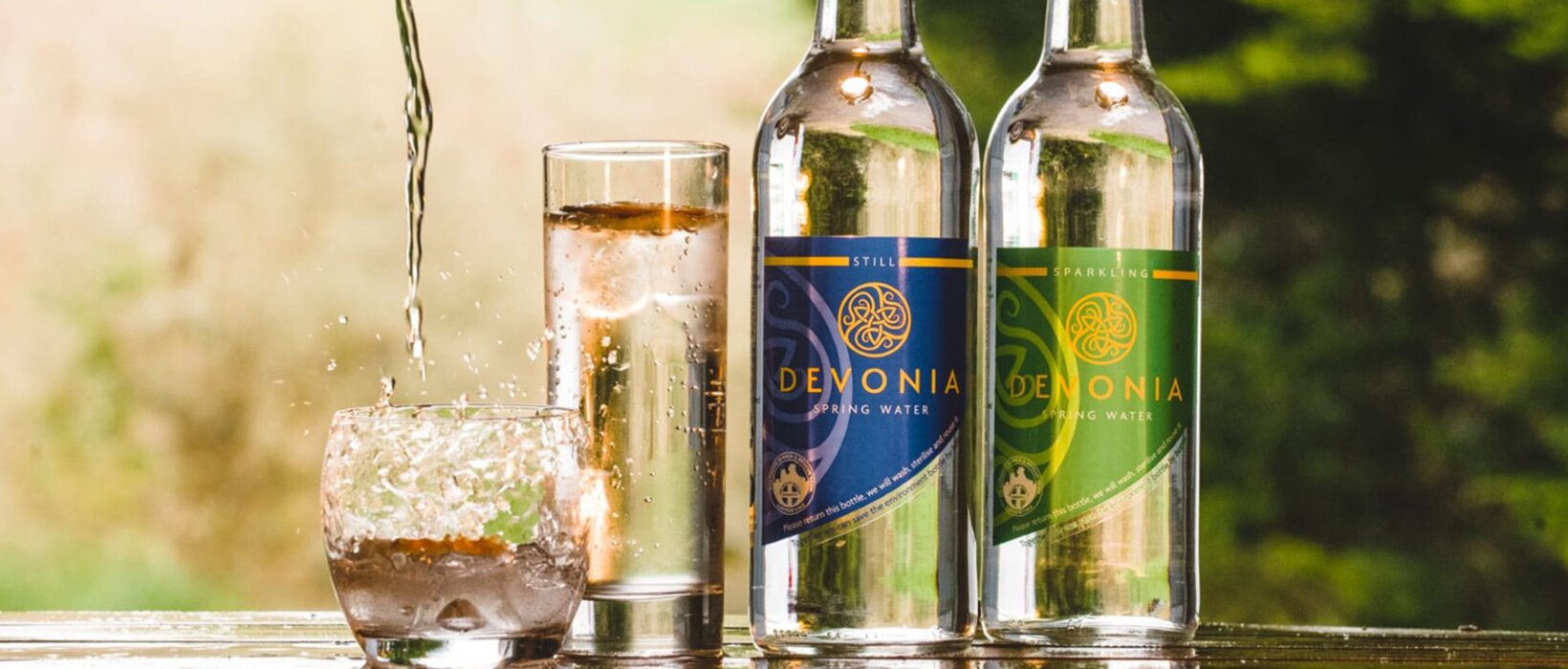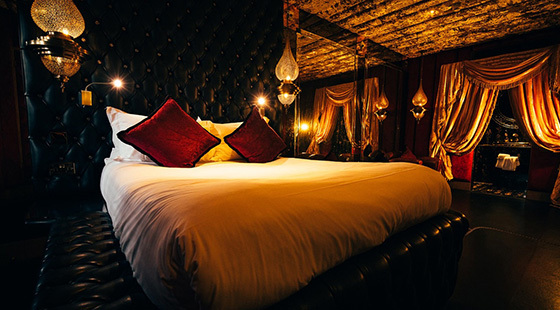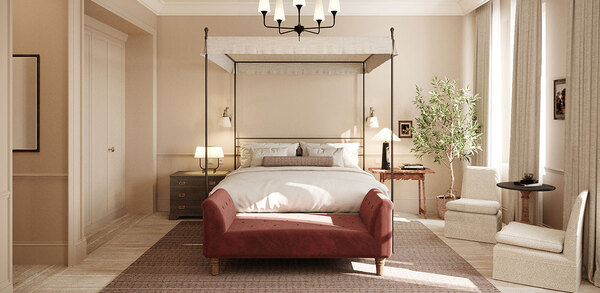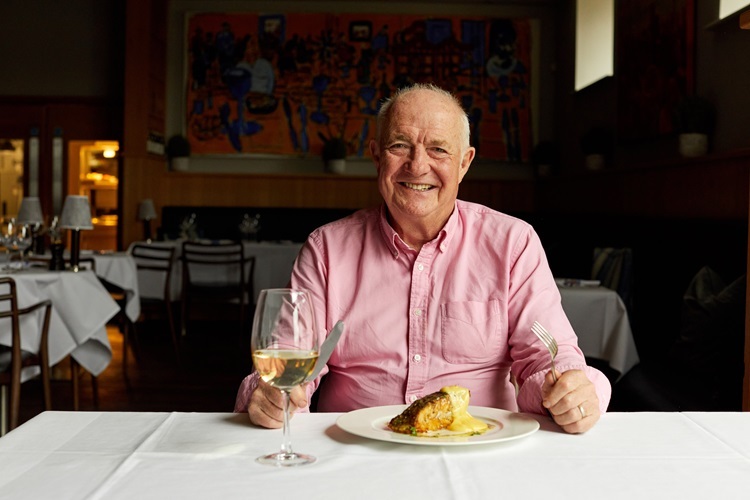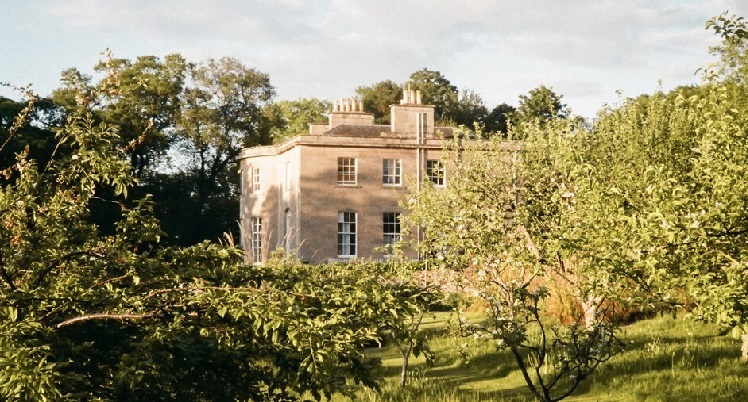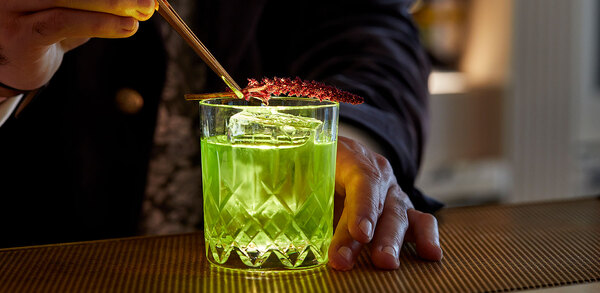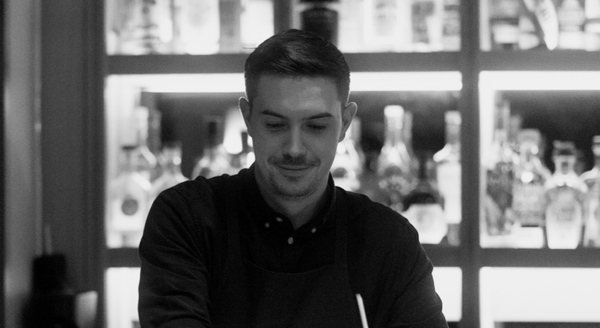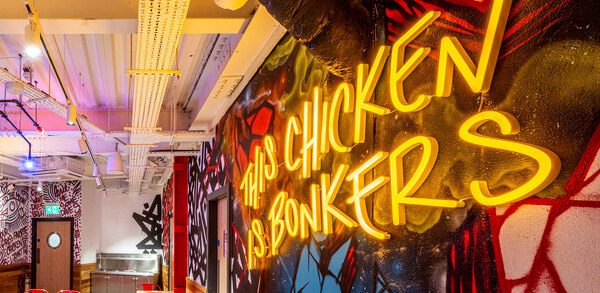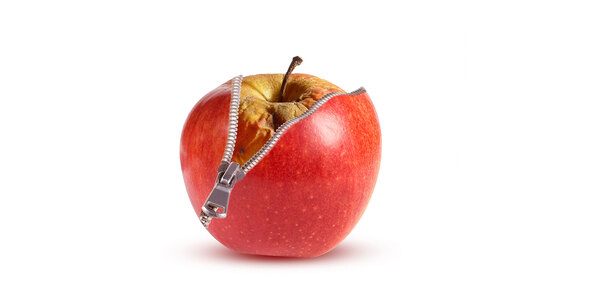Spin the bottle: how to choose the right water for your tables
Table water is already a profitable product – but it could do better. Ian Boughton discovers the secret to turning it into liquid gold
A report prior to lockdown claimed that 96% of hotel trade respondents believed the industry could do better at ‘selling’ water. Newer surveys suggest that during lockdown, retail sales of bottled water rose considerably, and that interest in water will continue to increase. Therefore, it is time to capitalise on it.
The concept of water as a priced product is always dangerous. A TV documentary has already asked why anyone should pay for a naturally-occurring item, adding that “the absurdity of water is that we’re spending billions moving water to people who already have it, to provide them with 30 varieties of something for which there is no actual variety.”
The water specialists retort that variety is what turns water from a commodity to a luxury product. We now have water sommeliers, and the president of the German Water Sommelier Union says that his members can present customers with ‘concrete adjectives’ to introduce customers to the entire variety of tastes and water compositions from right across Europe. And this theory has reached London with the launch of Fine Liquids, a retailer devoted to bottled water, sold at prices from £2.50 to £120 (that one from Patagonia).
The variety is what will sell your water, says Anthony Walker of the Natural Source Waters Association. “Natural-source waters provide a premium offering that many people prefer over tap or filtered.
“The overwhelming majority of all bottled water consumed in the UK is natural-source water, from protected underground sources, which is not chemically treated. Each water will have a different mineral balance created by the geology around the source, so some are softer, making them taste smoother, whereas others are crisper and may taste more refreshing.
“So, many customers do have a preferred water, and in the same way that a venue takes pride in its wine list, it can take pride in the choice of water that it offers.”
The natural-source water brands like this argument. “There is a huge difference between waters,” says Deeside’s managing director Martin Simpson. “Our trade customers promote Deeside mineral water as ‘one of the purest in the world’ due to its very low mineral content. This gives a clean, smooth taste, very different to drinking a highly-mineralised water, and it has health qualities not found in other waters, proven by multiple research studies.”
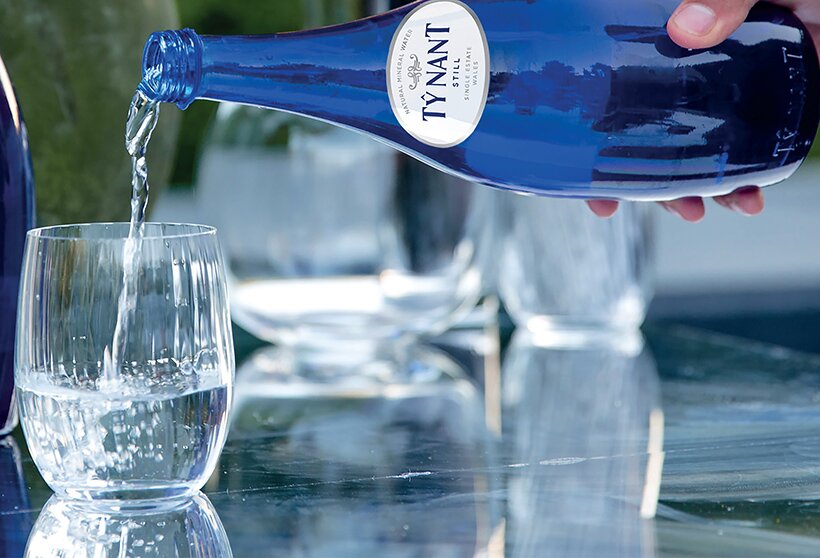
Locally sourced
An infamous story about Margaret Thatcher is that while visiting an area famous for its local water, and conscious of the value of publicity, she asked for a mineral water. Someone brought her a Perrier and she hit the roof. Do we do enough to actually make a feature of British waters?
“Some may think one water brand on the table is no different to any other,” acknowledges Hannah Fletcher, sales manager at Welsh mineral water brand Tyˆ Nant. “But a water brand reflects what customers want – something they are happy to drink, because it reflects their personal values. Guests increasingly want to know provenance, and the story of our natural aquifer in beautiful, unspoilt Wales is something that can be used to build value to the drinker.”
Stories to be told include Highland Spring’s claim of its status as ‘guardians of 2,500 acres of natural, organic and untouched land, the home of our natural-source water’, adding that it has planted half a million trees, and ‘puts as much care into the source as we do into the packaging’.
Matthew Orme, director of Wenlock Spring, insists that local water is worthy of promotion: “Chefs take pride in their ingredients, yet their restaurants serve filtered, chlorinated tap water. Provenance matters – natural source water is an appealing proposition that shouldn’t be squandered.”
Mouthwatering
The argument from filtered-water enthusiasts is the exact opposite of the natural-source people. Filtering your incoming water removes all elements, they say, and therefore the result is ‘pure’ water.
“There is an element of subjectivity in assessing taste variations between brands of table water,” says Paul Proctor, managing director at EcoPure, “but water that has been filtered through our system will unfailingly deliver water in its purest form. Any element of chlorine and other particles that can affect taste is completely removed. When water from this process is dispensed into reusable glass bottles, there is zero chance of taste being affected through contact with ageing plastic.”
Branding reusable glass bottles for a venue is always promoted as a great idea, and there are many premises who believe in the concept of ‘their own’ water, filtered on-site and served in bespoke bottles. It is a business choice. At the Red Lion in Cromer, Norfolk, which has just won an AA rosette, director Jo Alger did use table-talkers promoting her house water in her own branded bottles… but then stopped.
“Customers took some notice – but not as much as they do now that we keep our gin bottles and fill them with water! The bottles were expensive to purchase and many went missing, so we would not do it again.”
By contrast, the Fuller’s pub chain says that a house water system “is very simple to do, more sustainable as the branded glass bottles are reusable, and cost-effective against buying in bottled water”. Having said that, Fuller’s does use two systems, offering branded bottled water in parts of its estate. It works with Belu, whose natural mineral water is drawn from the hills of mid-Wales, ‘providing a pure, crisp taste’.
“The mineral composition does give water a ‘taste’,” confirms Belu’s chief executive Natalie Campbell. “Some waters can be salty, some buttery-sweet. The mineral taste comes through the strongest in the sparking category, where carbonation engages with the taste buds in a more heightened way.”
However, rather unusually, Belu also offers a filtration system, and says that this can be the choice for a venue wanting to reduce its carbon impact and single-use materials.
“For most customers, the choice goes beyond taste to sustainability and removing single-use packaging. This is now the biggest driver for our customers,” she adds. Indeed, a market research report says that this year’s growth “will be hindered by the plastic problem”, although PET bottles are now the most collected and recycled items in Europe.
“We have long supported a deposit-return scheme, to improve both collection rates and the quality of material collected, for a better feedstock of material to be reused,” says Walker at the Natural Source Waters Association. “Deposit-return schemes have already achieved collection rates of more than 90%, with Germany and Nordic countries performing best.”
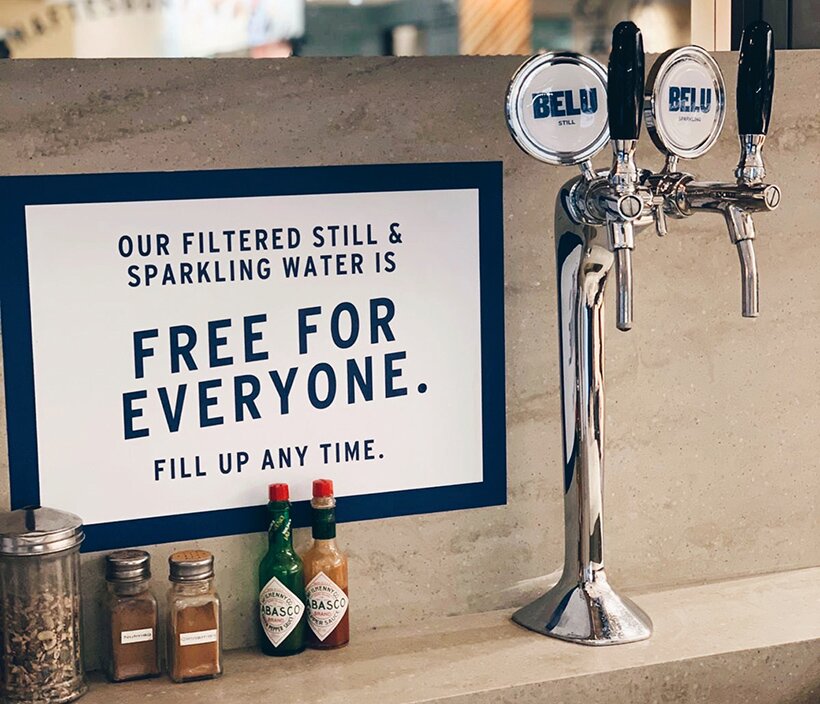
Plastic isn’t fantastic
There are many alternative ideas. The Australian brand Just Water has created a paper-based carton with sugarcane bottle cap, and has claimed in-room listing in five luxury hotels. In the UK, Nobl Water is aiming to become the UK’s lowest carbon-footprint brand, and claims early in-room success in several boutique hotels, packing its Mendip spring water in cartons that are 95% plant-based material, and themselves recyclable.
“The 100% recycled aluminium bottle of spring water is the way forward for our industry,” comes the firm statement from Ben Richardson, founder of Berrington Re:Water. “Our Re:Water is the world’s first such spring water bottle which can be infinitely and widely recycled.
“We’ve been bottling for 20 years, and we became increasingly frustrated that many so-called solutions were really adding to the problem – some containers made from different materials need to be separated in order to be recycled, and in practice that rarely happens.
“Now, our biggest success story is Fridays, which sells our new bottle, encouraging the customer to take it with them to refill throughout the day. The suggested price of £2.99 is premium-end, and they’ve seen sales nearly double over glass volumes; figures at the likes of the Itsu chain have also been staggering – 25% growth over bottled water sales.
“And we were selected by the UN to supply COP26, so we are leading the way in sustainable bottled water.” Cleverly planned reuse is the key, says Neil Graham, owner of Devonia Water: “The increased need to show sustainability means hospitality businesses do best to use locally-sourced water, not purchasing from a wholesaler. We’re the only spring water company in southern Britain with a business model based on the concept of washing and reusing our bottles time and again – every drop of the pure water from our ancient spring is delivered in a glass bottle, which is collected to be used again, and again and again. We’ve reused 2.2 million bottles, saving nearly 300,000 kilos of glass.
“Everyone thinks putting a glass bottle in a recycling bin is good, but that bottle travels an awfully long way before it’s brought back into use – we use 94% less energy the way we do it, compared to recycling glass and reforming it into a bottle.
“Recycling glass bottles isn’t the best way to help the environment – reusing them is.”
Keep it clean
“The only viable alternative to disposable plastic is a recyclable product such as a glass bottle or carafe, or their plastic equivalents,” says Paul Anderson, managing director at Meiko.
“For maximum choice of style and freedom to change water suppliers without hassle, your own bottles is the only way to go. But how do you wash them, maintaining hygiene and giving a hand-polished sparkle without using excessive labour and chemicals?
“Our M-iClean undercounter dishwasher can now use a simple bottle-wash rack which takes seconds to fit. The machine has the option of reverse osmosis water treatment, for sparkling, hand-polished results.”
Suppliers
Belu belu.org
Berrington Re:Water berringtonwater.com
Deeside www.deesidewater.co.uk
Devonia www.devoniawater.co.uk
EcoPure Waters www.ecopurewaters.com
Highland Spring highlandspring.com
Meiko www.meiko-uk.co.uk
Natural Source Waters Association www.naturalsourcewaters.org.uk
Nobl noblthirst.com
Tŷ Nant tynant.com
Water Sommelier Union www.watersommelier-union.com
Wenlock Spring www.wenlockspring.co.uk



